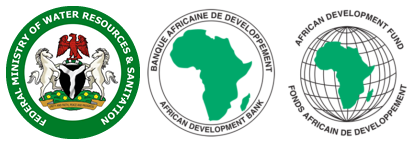PROGRAMMES AND PROJECTS OF THE DEPARTMENT
The Programmes and Projects prepared by the Department of Water Supply are based on a vision for national sector development and provide a proposed intervention strategy in the water supply and sanitation sector in three segments, namely; Urban Water Supply, Small Towns Water Supply and Rural Water Supply.
RURAL WATER SUPPLY PROGRAMME
- Federal Government Intervention
- Intervention by International Agencies And Development Partners
- Federal Government of Nigeria collaboration with Unicef/Dfid Rural Water Supply And Sanitation Programme
- Japanese Grant Aid Programme For Rural Water Supply Programme
- Chinese-Assisted Rural Water Supply Programme
- African Development Bank (AfDB) Assisted Rural Water Supply And Sanitation Initiative (RWSSI)
Generally the rural water supply technology options in Nigeria are basically hand dug well, shallow boreholes fitted with hand pumps, motorized boreholes rainwater harvesting and other facilities including protected springs of which are depended groundwater resources.
DECRIPTION OF THE PROJECT (AfDB Assisted): RURAL WATER SUPPLY AND SANITATION INITIATIVE (RWSSI) IN NIGERIA
BACKGROUND OF RWSSI IN NIGERIA
Following a request from the Federal Government of Nigeria in July 2003 to benefit from the African Development Bank’s RWSSI, the Bank fielded an identification mission in December 2003 and then provided the country with a financial assistance to prepare a National RWSS Programme. Subsequently, the National RWSS Programme which included investment sub programmes for the 36 states, and the Federal Capital Territory of Abuja (FCTA) together with Programme Implementation Manual (PIM), was prepared in consultation with all stakeholders and donors in 2005. In November 2005, a preparation mission was undertaken by the Bank to discuss the National RWSS Programme and Bank’s intervention. On 24 November 2005, a national water supply and sanitation workshop was organized by the FMWR and attended by stakeholders from federal ministries, state ministries, donors, NGOs and civil society organizations.
At the workshop, consensus by all stakeholders and was made on utilizing the programme as a framework for RWSS activities. Thereafter, a pre appraisal mission was undertaken in August 2006 followed by an appraisal mission in March/April 2007 to design and develop the Bank intervention in Yobe and Osun States in the National RWSS Programme. This has been carried out in collaboration with the relevant Government agencies, stakeholders and other multilateral and bilateral donors through donor meetings held on in August 2006 and March 2007. The National RWSS programme was then launched in a stakeholder meeting on 30 March 2007 during the appraisal mission, whereby all stakeholders and donors, through a joint Memorandum of Understanding (MoU), agreed to adopt the National RWSS Programme as a framework for RWSS interventions. The Nigeria RWSS Programme is in line with the Bank’s Rural Water Supply and Sanitation Initiative (RWSSI), developed to address the challenges of providing basic water supply and sanitation services to the hitherto forgotten population of rural Africa. The Bank intervention under ADF considers two states of Yobe and Osun that satisfied the demand driven self-selection criteria for the first Phase.
The project took off in 2008 with the African Development Bank’s credit of US$87million including FGN and States counterpart contributions. The Loan Agreement was signed on May 15, 2008. It was formally launched in July, 2008 and subsidiary Loan agreements for the two states signed on 23rd September, 2008.
Implementation Arrangements
The implementation of the Sub-programmes in Yobe and Osun follows the implementation arrangement set for the National RWSS Programme, which utilizes the existing institutional structures.
The Rural Water Supply and Sanitation Agency (RWSSA) of Yobe State and the Rural Water Supply and Environmental Sanitation Agency (RWESA) of Osun state are be the respective Executing Agencies under the auspices of the State Ministries of Water Resources. Following the demand-responsive process and decentralization policy, the Local Government Authorities (LGAs) in each state in collaboration with communities are fully involves in projects execution. Communities are involved in every phase of the project cycle through the respective Water and Sanitation Committees (WASCOMs), which are being strengthened to play important roles that include (i) needs identification, (ii) planning, (iii) contribution towards the capital cost, and (iv) operation and maintenance.
At the national level, the Federal Ministry of Water Resources (FMWR) is responsible for the overall policy and regulatory framework and will be in charge of monitoring, evaluation, coordination and partnership with donors.
Main Expected Outcomes
The programme was set up to achieve the following;
- The expected main achievements on the infrastructure provision in the two States are as presented in the table below.
| Infrastructure | Yobe | Osun | Total |
| Motorized Borehole (MBH) | 309 | 96 | 405 |
| Hand Dugwell (HDW) | 1,754 | 605 | 2,359 |
| Handpump Borehole (HPBH) | 1,570 | 542 | 2,112 |
| Water point in Schools/Public Places | 714 | 220 | 934 |
| Sanplat Latrines | 142,817 | 48,412 | 191,229 |
| VIP Latrines | 47,091 | 11,260 | 58,351 |
| VIP Latrines in Schools/Public Places | 1,758 | 636 | 2,394 |
The target population is 3.32 million with water facilities and 2.98 million with Sanitation services. The sub-programmes will thus contribute up to 3.60% to the national targets relating to the safe water supply. Its contribution to the national Sanitation target is estimated at 3.23 %.
- Also it is expected at the end of the programme that;
- 47 WES units in LGAs set up and equipped
- 664 women empowered and trained to ensure hygiene in communities,
- 18 training package conducted
- 8 NGOs and 50 private drillers supported and trained.
- Support will be provided to enhance the process of mainstreaming sector policies, institutional strengthening at the federal, state and local government levels in order to manage implementation of the Sub-Programmes and ensure effective monitoring, evaluation and feedback.


